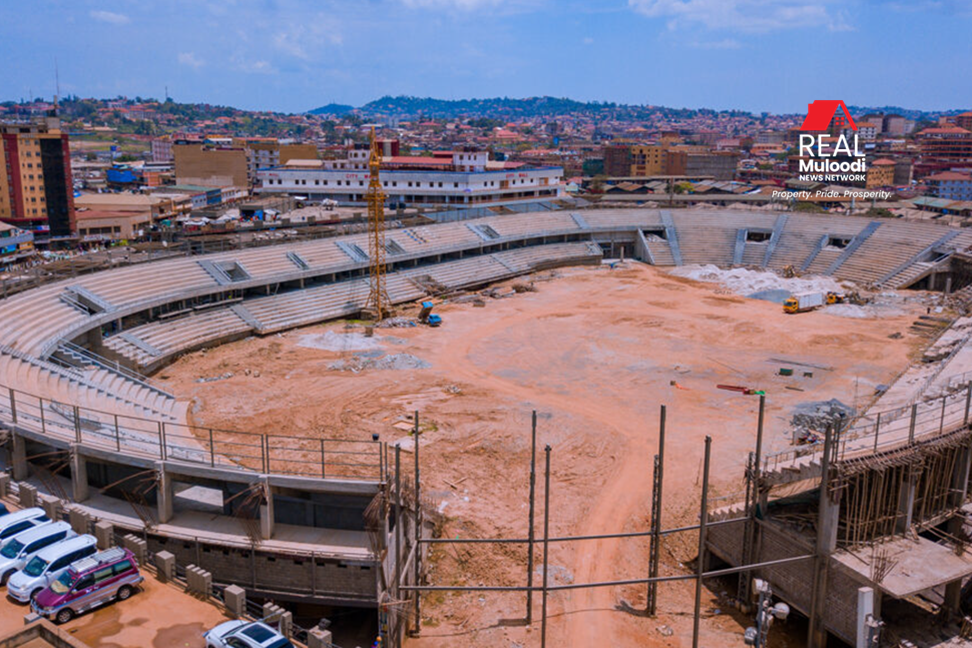UGANDA, Kampala | Real Muloodi News | Construction delays of the much anticipated 35,000-capacity Nakivubo War Memorial Stadium have drawn criticism from a cross-section of the public, overshadowing the project’s progress which has now reached 75% complete.
In 2017, the Nakivubo Stadium Board under the Government of Uganda announced it’s partnership with Ham Enterprises, owned by real estate muloodi, Hamis Kiggundu (Ham), to rebuild the Nakivubo War Memorial Stadium.
The vision was that Uganda’s oldest and second largest stadium would one day be transformed into a top-notch sporting venue and business complex, featuring an impressive range of amenities.
To manage the redevelopment plan, Ham hired renowned Ugandan construction firm, Roko Construction. The project was expected to be finished within 5 years after the contract’s signing.
However, 7 years on and progress on building the stadium has been sluggish owing to several issues, one of the biggest being the COVID-19 pandemic.
Although Ham concedes the delays with the historic stadium’s completion, he insists that work is still being carried out to complete the structure.
Tycoon Hamis Kiguundu says, “COVID-19 was a major setback, delaying us by almost three years, denting our cash flow, in addition to raising the cost of production.…at this level, the stadium is self-evident. We have plans to fully enclose the stadium in the future, but as for now we have erected advertising boards to bar spectators from watching outside the stadium.”
The general Ugandan public has not stopped checking on and wondering why the project has been delayed.
Ham laments the persistent criticism and negativity of his fellow Ugandans, saying, “I have met many challenges with this project but above all, Ugandans are too negative. If only we could find a way of eradicating that mindset.”
He adds, “In many cases we fail to take the responsibility to develop ourselves and the nation as well, then resort to pulling down those who take on the attempt to put up sustainable developments.”
Ham has been so significantly impacted by Covid-19 that the initial project budget of US$50 million has tripled. According to Hamis, he now anticipates spending at least US$150 million to see it through, owing to the significant increase in the costs of construction materials and imports.
“Because of the rise in the cost of production, for a stadium I estimated to spend around 50 million dollars, I could end up spending around 150 million because of the price increase of construction material.”
He adds, “But with God, anything is possible. It is because of God that we have come this far.”
The Quality of Work
The mobility of international football facilities inspectors was also restricted by Covid-19. However, since restrictions were lifted officials from the Federation International Football Association (FIFA) have been closely monitoring and inspecting the Nakivubo Stadium construction, ensuring compliance with all FIFA construction requirements which internationally recognised football stadiums must adhere to.
The plan depicted in the artistic impression is the one they have been working with thus far, according to Roko Construction engineer and project manager Aine Ashaba.

To improve job quality, Roko Construction has moved forward with consulting some of the experts responsible for building the various stadiums in South Africa.
According to FIFA regulations, the stadium will have a contemporary lighting system, announcing boards, large screens, other indoor games, and many other features.
35,000 spectators are expected to watch athletic events at the venue. Additional athletics, netball, bodybuilding, basketball, volleyball, boxing, and other sports facilities will be housed.
The stadium will also contain VIP and VVIP areas in addition to the general section. Additionally, it will include executive wings with each having 20 seats and several amenities.
This top-notch facility will contain six restaurants, two 300-seat movie theatres, medical rooms for both the home and visiting teams, referee rooms, and other amenities in addition to the magnificent dressing rooms.
The Developer’s Reassurance
Ham is steadfastly devoted to fulfilling his commitment to Ugandans to construct cutting-edge institutions.
He reassures Ugandans that the project is on schedule and will demonstrate their talent for high-calibre performance.
He says that in all actuality, this is not simply a stadium. It serves as a legacy and a loud and obvious warning that Ugandans must promote their motherland if the nation is to grow.
The business tycoon thinks that once completed, this project will serve as a suitable starting point for other Ugandans to pursue the route of nation-building without fancying travelling outside to experience improvement.
His goal is to turn it into a top-notch stadium in the centre of Kampala, the nation’s capital.
Nakivubo War Memorial Stadium Brief History
The Nakivubo Stadium was first built on April 1st, 1926. It was later renamed “War Memorial” when the British administration renovated it in 1954 in honour of the Ugandans who sacrificed their lives in the Second World War.
WATCH: NAKIVUBO WAR MEMORIAL STADIUM RECONSTRUCTION
READ MORE LIKE THIS:
Hamis Kiggundu announces ‘HAMZ CLUB’, an Integrated Sports Complex for Uganda’s Youth
Battle of the Real Muloodis in the Sports Stadium Arena: Rajiv Ruparelia vs. Hamis Kiggundu



